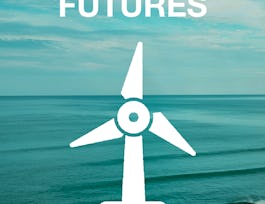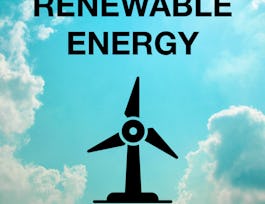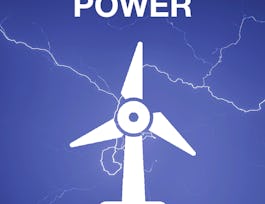Understanding renewable energy technologies is important, but equally important is knowing how to effectively deploy these technologies to provide renewable energy to end-users – the topic of this course. Upon completion of the course, you will understand the development and management of renewable energy projects, large and small, from conception to launch and subsequent operation.


Renewable Energy Projects
This course is part of Renewable Energy Specialization
Taught in English
Some content may not be translated

Instructor: Stephen R. Lawrence
6,818 already enrolled
Included with 
Course
(103 reviews)
Recommended experience
What you'll learn
How to quickly assess the feasibility of a proposed renewable energy project.
How to plan and finance a renewable energy project.
How to execute the construction and ongoing operations of a renewable energy project.
Skills you'll gain
Details to know

Add to your LinkedIn profile
5 quizzes
Course
(103 reviews)
Recommended experience
See how employees at top companies are mastering in-demand skills

Build your subject-matter expertise
- Learn new concepts from industry experts
- Gain a foundational understanding of a subject or tool
- Develop job-relevant skills with hands-on projects
- Earn a shareable career certificate


Earn a career certificate
Add this credential to your LinkedIn profile, resume, or CV
Share it on social media and in your performance review

There are 5 modules in this course
This first week’s module examines the important topics of renewable energy project planning and site selection. The first step in developing a renewable energy project is to undertake an initial high-level feasibility study based on project goals and objectives, resource availability, local conditions, and preliminary financial analysis. Based on the results of this analysis, a decision must be made to proceed with the project plan, modify the plan, or abandon the plan in favor of other opportunities (the go-no-go decision). If the decision is made to proceed with a project, the location and site of the project is decided based on anticipated energy resources, regulatory and economic environments, and stakeholder interests. With a positive feasibility report and a site selected, intensive development of a renewable energy project can proceed!
What's included
11 videos2 readings1 quiz1 discussion prompt
The module this week summarizes how we can thoroughly measure a renewable energy resource (solar, wind, hydro…) over time at a chosen project site and to develop energy generation forecasts. Next, we address the needed technologies, equipment, and infrastructure necessary to develop a renewable energy project. With this information, we will be prepared to undertake detailed financial analysis of the developing project in the next module!
What's included
12 videos2 readings1 quiz1 discussion prompt
In the module for this week, we survey the many ways that renewable energy projects are financed. First, we review basic financial concepts such as including the time value of money (TVM), future and present value, perpetuities and annuities, discount rates, discounted cash flow (DCF), net present value (NPV), and Internal Rate of Return (IRR). We then use these concepts to create project financial profit, loss, and cash flow projections. We conclude with a review of the various ways that renewable energy projects are financed and how renewable energy projects are organized depending on their financial structure. Since (in)appropriate financing can make or break a project, a good understanding of project financing is imperative for renewable energy project developers!
What's included
17 videos2 readings1 quiz1 discussion prompt
After extensive project data gathering and planning, it is finally time to execute our plan, to construct our renewable energy plant, and to generate renewable energy! Getting to this point has been a long process, but recall that “a failure to plan is planning to fail.” In this module, we describe the steps required to construct a renewable energy plant; commission it to ensure it is operating properly; and then to operate and maintain the plant over its intended lifespan. Finally, at the end of its life, we will need to determine if the plant can be economically “repowered,” or if it should be decommissioned and torn down.
What's included
13 videos2 readings1 quiz1 discussion prompt
The last week of Renewable Energy Projects includes a final exam that will allow you to demonstrate your mastery of the content covered in this course. Take some time to study, review any concepts or topics you found challenging, and then take the final exam!
What's included
1 quiz
Instructor

Offered by
Recommended if you're interested in Environmental Science and Sustainability

University of Colorado Boulder

University of Colorado Boulder

University of Colorado Boulder

Fundação Instituto de Administração
Why people choose Coursera for their career




Learner reviews
Showing 3 of 103
103 reviews
- 5 stars
82.69%
- 4 stars
16.34%
- 3 stars
0.96%
- 2 stars
0%
- 1 star
0%

Open new doors with Coursera Plus
Unlimited access to 7,000+ world-class courses, hands-on projects, and job-ready certificate programs - all included in your subscription
Advance your career with an online degree
Earn a degree from world-class universities - 100% online
Join over 3,400 global companies that choose Coursera for Business
Upskill your employees to excel in the digital economy
Frequently asked questions
Access to lectures and assignments depends on your type of enrollment. If you take a course in audit mode, you will be able to see most course materials for free. To access graded assignments and to earn a Certificate, you will need to purchase the Certificate experience, during or after your audit. If you don't see the audit option:
The course may not offer an audit option. You can try a Free Trial instead, or apply for Financial Aid.
The course may offer 'Full Course, No Certificate' instead. This option lets you see all course materials, submit required assessments, and get a final grade. This also means that you will not be able to purchase a Certificate experience.
When you enroll in the course, you get access to all of the courses in the Specialization, and you earn a certificate when you complete the work. Your electronic Certificate will be added to your Accomplishments page - from there, you can print your Certificate or add it to your LinkedIn profile. If you only want to read and view the course content, you can audit the course for free.
If you subscribed, you get a 7-day free trial during which you can cancel at no penalty. After that, we don’t give refunds, but you can cancel your subscription at any time. See our full refund policy.

